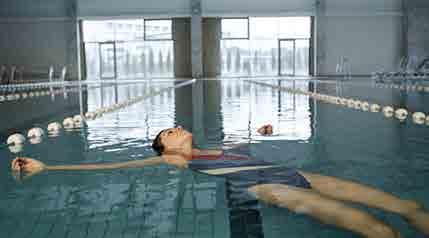
34 minute read
SPOTLIGHT: MONTENEGRO
Filmland Montenegro – Kino der Gegensätze The Cinema of Montenegro – Shaped by Contrasts
SPOTLIGHT: MONTENEGRO wird gefördert vom Ministerium der Justiz und für Europa und Verbraucherschutz des Landes Brandenburg. SPOTLIGHT: MONTENEGRO series is supported by the Ministry for Justice and Europe and Consumer Protection of the State of Brandenburg.
Advertisement
Zwischen spektakulären Bergmassiven und mondäner Adria-Küste gelegen, hat das seit 2006 unabhängige Montenegro – jenseits seines Renommees als außergewöhnliches Urlaubsparadies – seit jeher eine ganz eigene Identität entwickelt. Unter anderem kann es sich inzwischen als Filmland behaupten. 2017 wurde in dem Adria-Anrainerstaat mit der Gründung des Film Centre of Montenegro das Fundament für eine transparente und nachhaltige Filmförderung gelegt, nachdem bereits in den Jahren zuvor einige montenegrinische Filme auf internationalen Festivals Erfolge feierten. Die Filmreihe SPOTLIGHT: MONTENEGRO verbindet Entdeckungen aus der Filmgeschichte mit Perspektiven für die Zukunft. So kommen etwa die Arbeiten des Dokumentaristen Momir Matović, der die faszinierenden Landschaften Montenegros und dessen Menschen hintergründig erkundet, auf die Cottbuser Leinwände. Matovićs Werk steht in der Tradition des Kult-Regisseurs Živko Nikolić, der sich in den 1970er- und 1980er-Jahren pointiert mit den kulturellen Unterschieden zwischen den ländlichen Gebirgsregionen und dem urbanen Süden des Landes auseinandersetzte. So setzte er etwa dem Gegensatz der traditionell geprägten Bergdörfer und den libertären Nudistencamps an der Küste mit SCHÖNHEIT DER SÜNDE 1986 ein augenzwinkerndes Denkmal.
Heute schreiben junge Regisseure die Filmgeschichte weiter, die von Gegensätzen fasziniert ist, wie sie einem nicht nur, aber doch in ganz besonderer Weise in Montenegro begegnen. Die Schwarze Komödie DIE STECKNADEL von Ivan Marinovićs beschreibt zum Beispiel den zwischen einem misanthropischen, orthodoxen Priester, der in sein Geburtsdorf zurückkehrt und denen, die nie von dort weggegangen sind. Dabei ist Montenegro, allem Pathos der Naturgewalten zum Trotz, schon längst in der urbanen Normalität angekommen: Unten, in der Ebene in und um die Hauptstadt Podgorica, spiegeln Krimis wie Pavle Simonovićs UNTER DER BRÜCKE oder Gesellschaftsdramen wie Marija Perovićs BRÜSTE auf pointierte Weise zwischenmenschliche Konfliktsituationen wider, wie sie überall auf der Welt vorkommen können und auf diese Weise dann vielleicht doch wieder nur in Montenegro. BB Located between spectacular mountain ranges and the glamorous Adriatic coast Montenegro, which gained independence back in 2006, has always strived to develop an identity of its own that goes beyond its reputation as a holiday paradise. The results thereof include a thriving domestic film industry. 2017 saw the opening of the Film Centre of Montenegro, which laid the foundation for transparent and sustainable film promotion in this state by the Adriatic Sea, this following on from the success achieved by Montenegrin films at international festi
vals in recent years.
That brings us to this year‘s SPOTLIGHT: MONTENEGRO series, which combines dis- coveries from film history with perspectives for the future. Thus, the works of documen- tary filmmaker Momir Matović, who explores the fascinating landscapes of Montenegro and its people, this year reach the screens of Cottbus. Matović‘s work follows in the tradition of cult director Živko Nikolić, who in the 1970s and 1980s focused on the cultu- ral differences between the country‘s rural mountainous regions and the urban south. In 1986 he paid tongue-in-cheek tribute to the contrast between traditional mountain villages and the libertarian nudist camps on the coast with THE BEAUTY OF VICE 1986. Today, young directors continue a tradition that is fascinated by contrasts which, though one encounters them elsewhere, stand out in Montenegro with particular intensity. The black comedy THE BLACK PIN from Ivan Marinovićs, for example, describes the rela- tionship between a misanthropic, orthodox priest returning to his native village and those who have never left. Despite all the pathos of the forces of nature it is home to, Montenegro long ago found its way into ur- ban normality: down in the lowlands in and around the capital Podgorica thrillers such as Pavle Simonić‘s LOWDOWN and social dramas like Marija Perović‘s BREASTS poin- tedly reflect interpersonal conflict situations as they occur the world over and yet in a way that is unique to Montenegro. BB
GRUDI BRÜSTE BREASTS
MARIJA PEROVIĆ / MONTENEGRO, KROATIEN, SERBIEN / MONTENEGRO, CROATIA, SERBIA, 2019, 92 MIN
Drei Freundinnen kommen bei einem Klassentreffen in ihrem Heimatort zusammen. Sie sind noch vertraut miteinander, aber nicht mehr wie damals. Eine lebt noch zu Hause, die beiden anderen in Serbien und in Kroatien. Eine ist geschieden, zwei sind verheiratet. Zwei haben Kinder, eine nicht. Eine ist todkrank, zwei sind entsetzt. Three friends get together at a school reunion in their home town. They still know one another, but not as well as back then. One still lives at home, the other two in Serbia and Croatia. One is divorced, two are married. Two have children, one doesn‘t. One is terminally ill, two are horrified.
Ana, Zorka und Jelena, alle drei Anfang 40, treffen sich nach langen Jahren in ihrem Heimatort Nikšić in Montenegro wieder. Sie haben sich lange nicht gesehen – beste Freundinnen, die unterschiedliche Wege gegangen sind. Jelena hat einen Ausländer geheiratet, lebt aber wieder in der Stadt. Zorka lebt in Belgrad und versucht verzweifelt, schwanger zu werden. Ana ist Biochemikerin in Split und weiß, dass sie Brustkrebs hat, verschweigt den anderen ihre Erkrankung aber, was die ihr übelnehmen. Fuki, ein Lebenskünstler, der in Nikšić geblieben ist und ohne Schulabschluss von zwielichtigen Geschäften lebt, hat das Vertrauen seiner alten Schulfreundinnen und sorgt für die kommunikativen Verbindungen zwischen den drei so ähnlichen wie unterschiedlichen Frauen. Ein vielschichtiges, sehr authentisches und persönliches Portrait über intime Dinge, die nicht immer intim bleiben. Der Film ist die Kinoversion einer erfolgreichen Miniserie, die auf dem letzten Seoul Drama Award Festival eine besondere Erwähnung der Jury erhielt. WMH
Ana, Zorka and Jelena, all in their early forties, meet again in their home town Nikšić in Montenegro after many years apart. Best friends who have gone their separate ways, they haven‘t seen each other for a long time. Jelena married a foreigner yet returned to the city. Zorka lives in Belgrade and is desperately trying to get pregnant. Ana, based in Split, is a biochemist and knows that she has breast cancer, a fact she hides from the others, much to their resentment. Fuki, a high school dropout and master of the art of living, who has stayed in Nikšić and wheels and deals his way to a living, enjoys the confidence of his old school friends and maintains the lines of communication between these three women who are, in equal measure, similar yet different. A complex, highly authentic and personal portrait of intimacies that don‘t always remain intimate, the film is the screen adaptation of a successful mini-series that received a special mention from the jury at the previous Seoul Drama Award Festival. WMH
Marija Perović — geboren 1972 in Belgrad, heute Serbien. Regisseurin, Produzentin, Drehbuchautorin. Sie studierte Film- und Fernsehregie an der Faculty of Drama Arts in Belgrad und hat mittlerweile bei mehr als 350 Produktionen mitgewirkt. Sie ist außerdem Präsidentin des Verbands für Filmschaffende Montenegros, lehrt als Professorin und engagiert sich für das Herceg Novi Film Festival. — born in 1972 in Belgrade, today Serbia. Director, producer, screenwriter. She studied film and television directing at the Faculty of Drama Arts in Belgrade and has since worked on more than 350 productions. She is also president of the Montenegrin Film Association, teaches as a professor and is involved in the Herceg Novi Film Festival. Filme PACKING THE MONKEYS, AGAIN! (2004) LOOK AT ME (2008) SOME LIMITLESS FREEDOM (2013, doc) BREASTS (2018, TV series) SPOTLIGHT: MONTENEGRO
Filmformat / Format DCP | Farbe / Colour Drehbuch / Script Vladislava Vojnović Kamera / Photography Dušan Grubin Ton / Sound ALEKSANDAR PROTIĆ Schnitt / Editing Nataša Pantić Musik / Music NEMANJA MOSUROVIĆ Ausstattung / Set Design Dragana Baćović Darsteller / Cast Marija Škaričić, Vojin Ćetković, Nada Šargin, Dubravka Drakić, Mira Banjac, Peđa Bijelac, Jelena Đukić, Danilo Lončarević, Branimir Popović Produzent / Producer Marija Perović, Dubravka Drakić Produktion / Production OPEN BOX STUDIO, office@openboxstudio.me, +382 67 66 22 89 Co-Produktion / Co-Production MEANDER FILM, MITROPA, VISIONARY THINKING Kontakt / Contact Visionary Thinking, Belgrade Dragan Petrović petrovic@visionary-thinking.net +381 11 244 1694 Baba Višnjina 9, 11000 Belgrade, Serbia
IGLA ISPOD PRAGA DIE STECKNADEL THE BLACK PIN
Der orthodoxe Priester Petar kehrt in sein Heimatdorf auf der idyllischen Halbinsel Luštica zurück, um sich um seine demente Mutter zu kümmern. Die Frauen verehren ihn, die Männer mögen ihn nicht. Nicht nur, weil er sich ihren akribisch geplanten Grundstücksgeschäften verweigert. Schwarze Komödie mit Westernelementen über (allzu) Menschliches zwischen Himmel und Erde. The Orthodox priest Petar returns to his native village on the idyllic peninsula of Luštica to look after his mother who is suffering from dementia. The women worship him, but the men don‘t like him. And that‘s not only because he is refusing to agree to their meticulously planned land transactions. Black comedy with Western elements about (all too) human behaviour between heaven and earth.
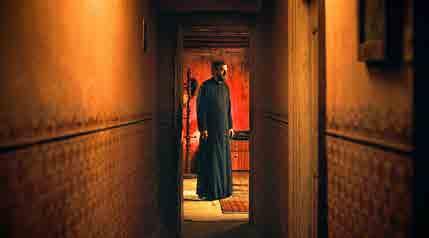
Ivan Marinović — geboren 1984 in Kotor, heute Montenegro. 2011 graduierte er in Filmregie an der FAMU in Prag. Zu seinen Arbeiten zählen mehrere Kurzfilme und ein Dokumentarfilm. Er ist außerdem Drehbuchautor. DIE STECKNADEL war sein Spielfilmdebüt. Derzeit arbeitet er an seinem zweiten Spielfilm mit dem Titel FOREVER HOLD YOUR PEACE, das den ScripTeast Award 2019 gewann. — born in 1984 in Kotor, today Montenegro. In 2011 he graduated in film direction at the FAMU in Prague. His work includes several short films and a documentary. He is also a screenwriter. THE BLACK PIN was his feature film debut. He is currently working on his second feature film, FOREVER HOLD YOUR PEACE, which won the 2019 ScripTeast Award. Filme A FOOTBALL STORY (2009, short) PRAISE THE SEA, STICK TO THE SHORE (2011, doc) SPOTLIGHT: MONTENEGRO
Petar hat oft die Pfarrei gewechselt. Er ist kein einfacher Charakter und nach der Trennung von seiner Frau verbittert und ungeduldig. Seine schlagfertigen, oft sarkastischen Anmerkungen zum Dorfalltag und die Verachtung des in der Region noch praktizierten Aberglaubens kommen nicht bei allen gut an. Genauso wenig wie die Weigerung, den lange vorbereiteten Grundstücksdeal mit einem englischen Investor zu unterschreiben, der den nahen Wald in einen Golfplatz mit Hotelanlage verwandeln will. Beleidigungen und Drohbriefe machen die Runde. Als eine alte Frau stirbt, die von der Dorfgemeinschaft als Hexe verleumdet wurde, eskaliert beim Begräbnis der Konflikt. Derweil geht Petars demente Mutter ganz eigene Wege, und auch sein Sohn entzieht sich langsam dem väterlichen Willen. WMH Petar has often changed parishes. He is not a simple character and has become bitter and impatient since separating from his wife. His quick-witted, often sarcastic remarks about everyday life in the village and the contempt for the superstition still practiced in the region are not well received by everyone. Nor is his refusal to sign the painstakingly negotiated land deal with an English investor who wants to turn the nearby forest into a golf course with a hotel complex. Insults and threatening letters make the rounds. When an old woman dies who had been denigrated as a witch by the village community, the conflict then escalates at the funeral. Meanwhile, Petar‘s senile mother follows her very own path, and his son is also slowly bucking his father’s wishes. WMH
Filmformat / Format DCP | Farbe / Colour Drehbuch / Script Ivan Marinović Kamera / Photography Đorđe Arambašić Ton / Sound Ognjen Popić, Zoran Maksimović Schnitt / Editing Ivan Vasić Musik / Music Toni Kitanovski Ausstattung / Set Design Irena Marjanov Darsteller / Cast Nikola Ristanovski, Leon Lučev, Jelisaveta - Seka Sabljić, Bogdan Diklić, Ljubomir Bandović, Dragana Dabović, Goran Slavić, Dejan Đonović, Filip Klicov, Kristina Obradović, Tihana Ćulafić Produzent / Producer Mina Djukic Co-Produktion / Co-Production EED production Kontakt / Contact Soul Food, Belgrade Tijana Višnjić +381 63 106 1162 tijana.visnjic@soulfoodfilms.com Majke Jevrosime 39, 11000 Belgrade, Serbia
ISPOD MOSTA, MEĐU STIJENAMA UNTER DER BRÜCKE LOWDOWN
Es ist schon der zweite Mord im Mafia-Milieu in Podgorica. Salo, einer der Kommissare, ist mit dem Tempo der Ermittlungen nicht zufrieden. Er vermutet, dass hinter den Morden viel mehr steckt. Aber seine Kollegen wiegeln ab. Als er dem obersten Mafia-Boss auf die Schliche kommt, gerät er unter Druck. Montenegrinischer Film Noir mit Psychothriller-Elementen. It is already the second murder to occur within the mafia milieu in Podgorica. Superintendent Salo is not satisfied with the pace of the investigation and suspects that there is much more to the murders than meets the eye. His colleagues however remain unmoved. Suspecting the involvement of a leading mafia boss, he soon finds himself under pressure in this Montenegrin work of film noir completed with psycho thriller elements.
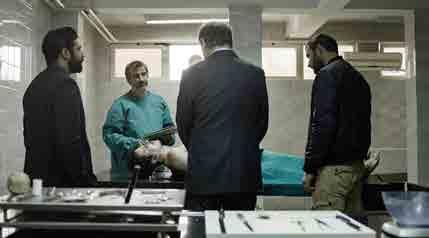
Pavle Simonović — geboren 1987 in Podgorica, heute Montenegro. Seit seinem Studium der Regie an der Faculty of Dramatic Arts in Cetinje drehte er verschiedene Kurz-, Dokumentar- und Werbefilme. Bei vielen Produktionen wirkte er als Regieassistent mit, u.a. bei DAS LETZTE KAPITEL von Nemanja Bečanović. UNTER DER BRÜCKE ist Simonovićs Spielfilmdebüt. — born in 1987 in Podgorica, today Montenegro. Since studying directing at the Faculty of Dramatic Arts in Cetinje, he has made various short films, documentaries and commercials. He has worked as an assistant director on many productions, including THE ASCENT by Nemanja Bečanović. LOWDOWN is Simonović’s feature film debut. Filme SPOTLIGHT: MONTENEGRO
Im Zentrum von Montenegros Hauptstadt Podgorica wird, unter der Brücke über dem Fluss Moraca, eine Leiche gefunden. Schnell wird klar, dass es sich um ein bekanntes Mitglied der örtlichen Mafia handelt: Petar, der Mann fürs Grobe, wurde vor seinem Tod brutal gefoltert. Kommissar Salo ist überarbeitet und nach dem Scheitern seiner Ehe höchst angespannt. Er schläft schlecht und bekommt Wutausbrüche, wie jetzt am Tatort, als er einem Fernsehteam die Kamera wegreißt. Er möchte an Maks, den obersten Mafiaboss, heran, aber sein Vorgesetzter wiegelt ab. Am Morgen erhält er einen seltsamen Anruf von einer Kreditgesellschaft, die ihn zu einem Gespräch über seine Zahlungsrückstände einlädt. Aber Salo hat nie einen Kredit aufgenommen. Die Ereignisse fangen an sich zu überschlagen. Seine Tochter verschwindet, und er soll einen Mord begehen. Und was hat Ratimir, sein Kollege und Freund, mit all dem zu tun? Höchst spannend entwickelt sich der anfängliche Krimi zu einem Psychothriller, der zwischen Wahn und Wirklichkeit einem fulminanten Ende entgegensteuert. WMH In the centre of Montenegro‘s capital Podgorica, a body is found under the bridge over the river Moraca. It quickly becomes clear that the victim was a well-known member of the local mafia: Petar, the man for the dirty work, was brutally tortured before his death. Inspector Salo is overworked and on edge after the failure of his marriage. He sleeps badly and gets into fits of rage, as occurs at the crime scene when he tears the camera away from a TV crew. He wants to talk to Maks, a leading mafia boss, and yet his superiors aren‘t convinced. The following morning he receives a strange phone call from a loan provider inviting him to talk about his arrears. Salo hasn‘t taken out a loan however, at which point things start to unravel. His daughter disappears, and he is to commit a murder. And what does Ratimir, his colleague and friend, have to do with all this? Enthrallingly what starts out as a murder mystery evolves into a psychological thriller which heads towards a dramatic conclusion in twists and turns that fluctuate between delusion and reality. WMH
Drehbuch / Script Stefan Bošković, Sehad Čekić Kamera / Photography Dušan Grubin Ton / Sound Luka Barajevic Schnitt / Editing Hrvoje Mrsic Musik / Music Beta Baroque Ausstattung / Set Design Djordjije Kalezic Darsteller / Cast Miloš Pejović, Stefan Bošković, Jelena Đokić, Marko Baćović, Branimir Popović, Mišo Obradović, Dejan Ivanić, Ana Vučković, Radmila Škuletić Produzent / Producer Sehad Čekić Produktion / Production Cut-Up Kontakt / Contact Cut-Up Ul. Hercegovačka 94, 81000 Podgorica, Montenegro T: +382 20 240 553 info@cut-up.me
IZMEĐU DANA I NOĆI ZWISCHEN TAG UND NACHT NEVERENDING PAST
Hoffnung und Schicksal: Drei Episoden erzählen von Vätern und Söhnen unterschiedlicher Epochen der jüngeren Geschichte in existenziellen Lebenssituationen. Zum Ende des Zweiten Weltkrieges in einem Bergdorf nach dem Sieg der Partisanen, beim Fall der Berliner Mauer im Flughafenwartesaal und in den Bergen nach den Zerfallskriegen des ehemaligen Jugoslawiens. Hope and fate: three episodes about fathers and sons from different eras from recent history in existential life situations. At the end of the Second World War in a mountain village after the victory of the partisans, during the fall of the Berlin Wall in the airport departure lounge, and in the mountains after the wars of secession in former Yugoslavia.
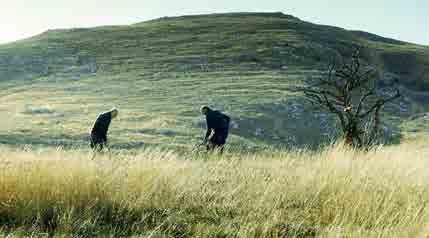
Andro Martinović — geboren 1977 in Nikšić, heute Montenegro. Er studierte Literatur sowie Film- und Fernsehregie. Seine Kurzfilme wurden auf zahlreichen Filmfestivals präsentiert. ZWISCHEN TAG UND NACHT ist sein Spielfilmdebüt und Montenegros Einreichung für den „Auslands-Oscar“ 2020. Er lehrt außerdem an der Faculty of Visual Arts und ist Leiter der Montenegrin Cinematheque. — born in 1977 in Nikšić, today Montenegro. He studied literature as well as film and television directing. His short films have been presented at numerous film festivals. NEVERENDING PAST is his feature film debut and Montenegro‘s submission for the „Foreign Oscar“ 2020. He also teaches at the Faculty of Visual Arts and is director of the Montenegrin Cinematheque. Filme NETAKNUTI SUNCEM (2002, short) DUELLUM (2004, short) MASKE (2009, short) SPOTLIGHT: MONTENEGRO
1945: Begeistert werden die kommunistischen Partisanen im Dorf begrüßt. Aber nicht alle teilen diese Freude. Manche haben Angst, denn jetzt wird Rache geübt: Einem Nachbarn wird das Haus in Brand gesetzt, ein anderer, der den Bruder des Partisanenanführers verraten hat, soll erschossen werden. Sein Sohn auch. Aber der Henker zeigt „Gnade“. 1989: Ein Vater wartet auf den Flug nach Berlin, um dort seinen kleinen Sohn Luka zu sehen. Aber der unerwartete Fall der Berliner Mauer verzögert den Start um viele Stunden. Die Ungeduld steigt, doch der Flug führt ins Verderben. 2017: Ein alter Mann möchte endlich Gewissheit über das Schicksal seines Sohnes haben, der aus dem Krieg nicht heimgekehrt ist. Eine Beerdigung würde den Eltern Frieden bringen, und so sucht der Vater die Leiche seines Kindes in verschiedenen Massengräbern. WMH 1945: the communist partisans are greeted enthusiastically in the village. But not everyone shares this joy. Some are afraid because people are now taking revenge on others: a neighbour‘s house is set on fire, another man, who betrayed the brother of the partisan leader, is to be shot. Along with his son. But the executioner shows “mercy”. 1989: a father is waiting for his flight to Berlin to see his little son Luka there. But the unexpected fall of the Berlin Wall delays the take-off for many hours. The impatience grows, but the flight leads into disaster. 2017: an old man would at last like to have certainty about the fate of his son who has not returned home from the war. A funeral would bring peace to the parents, and therefore the father is looking in different mass graves for the corpse of his child. WMH
Filmformat / Format DCP | Farbe / Colour Drehbuch / Script Andro Martinović Kamera / Photography Rade Vladić Ton / Sound Igor Perović Schnitt / Editing Andrija Zafranović, Nenad Pirnat Musik / Music Nemanja Bečanović, Slobodan Trkulja Ausstattung / Set Design Milenko Jeremić Darsteller / Cast Tihomir Stanić, Lazar Ristovski, Srdjan Grahovac, Mirko Vlahović, Marko Baćović, Jovan Krivokapić, Dubravka Drakić Produzent / Producer Ivan Djurović Produktion / Production ARTIKULACIJA FILM Co-Produktion / Co-Production Mimesis, Zillion film Kontakt / Contact ARTIKULACIJA FILM info@artikulacija.com +382 67 240 440 Gavra Vukovića 1/21, 81 000 Podgorica Montenegro
POSLJEDNJE POGLAVLJE DAS LETZTE KAPITEL THE ASCENT
Ein Schriftsteller sucht die Einsamkeit der Berge. Dort trifft er eine Bauernfamilie, die nichts mit dem Rest der Welt zu tun haben will und ihm mit Misstrauen begegnet. Ein subtiles Drama voller unterschwelliger Spannung und unterdrückter Gewalt, bei der die beeindruckende winterliche Berglandschaft zur eigenen Protagonistin wird. A writer is seeking the solitude of the mountains. He meets a family of farmers there, who wants nothing to do with the rest of the world and regards him with suspicion. A subtle drama full of subliminal tension and suppressed violence, with the impressive winter mountain scenery becoming its own protagonist.
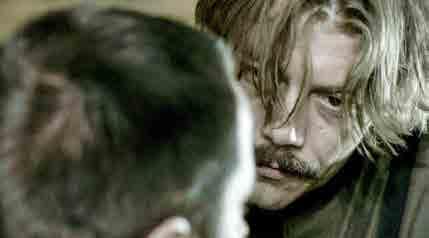
Nemanja Bečanović — geboren 1977 in Bar, heute Montenegro. Er schloss ein Studium der Film- und Fernsehregie an der Faculty of Dramatic Art in Cetinje ab. Seitdem ist er in vielen Bereichen des Films tätig: als Editor, Komponist, Produzent, Regisseur, fürs Fernsehen und unabhängige Produktionen. Er publiziert außerdem Artikel, lehrt an der Universität Donja Gorica und arbeitet für das Archiv der Montenegrin Cinematheque. — born in 1977 in Bar, today Montenegro. He studied film and television directing at the Faculty of Dramatic Arts in Cetinje. Since then he has worked in many areas of film: as editor, composer, producer, director, for television and independent productions. He also publishes articles, teaches at the University of Donja Gorica and works for the archive at the Montenegrin Cinematheque. SPOTLIGHT: MONTENEGRO
Jovan hat der Stadt den Rücken gekehrt. Denn er leidet an einer profunden Schreibhemmung und hofft, in der ländlichen Einsamkeit den ersehnten Frieden zu finden, um seinen ersten Roman fertig zu schreiben. Eine Freundin hat ihm ein Zimmer in einem spärlichen Holzhaus besorgt. Es liegt in einem abgeschiedenen und kargen Teil des Gebirges, inmitten einer verfallenden Ansiedlung. Aber er ist nicht wirklich allein. In dem Haus lebt auch eine kleine Bauernfamilie: ein Vater, sein Sohn und seine zwei Töchter. Vier Erwachsene, die keinen Kontakt zur Außenwelt haben möchten und weder lesen noch schreiben können. Zeko, der Vater herrscht mit eiserner Faust über seine Familie und behandelt den Städter Jovan, den Fremden, zunächst noch höflich, aber die Fassade fängt an, zu bröckeln. Eines Tages schenken sie Jovan ein Buch, die Bibel. Er liest ihnen die Passionsgeschichte aus dem Johannes-Evangelium vor – was ihm zum Verhängnis wird. WMH Jovan has turned his back on the city because he is suffering from a profound writer‘s block and hopes to find the longed-for peace in rural isolation so that he can finish his first novel. A girlfriend has organised a room for him in a sparse wooden house. It lies in a secluded and barren part of the mountains, in the middle of a crumbling settlement. But he is not really alone. A small family of farmers is also living in the house: a father, his son and his two daughters. Four adults who don‘t want to have any contact with the outside world and can neither read nor write. Zeko, the father, rules his family with an iron fist and initially treats the city dweller Jovan, the stranger, politely, but the facade begins to crumble. One day, they give Jovan a book, the Bible, as a present. He reads them the Passion of Christ from the Gospel according to St. John – sealing his subsequent fate. WMH
Drehbuch / Script Aleksandar Bečanović, Nemanja Bečanović Kamera / Photography Jure Verovsek Ton / Sound Aleksandar Protić Schnitt / Editing Nemanja Bečanović, Svetlana Dramlic Musik / Music MetaSound Ausstattung / Set Design Stanislav Nikicevic Darsteller / Cast Varja Djukic, Dejan Ivanic, Vlado Jovanovski, Amar Selimovic, Inti Sraj, Ana Vuckovic Produzent / Producer Ivan Đurović, Sehad Čehić, Janez Ković Produktion / Production Artikulacija Film Kontakt / Contact Artikulacija Film Gavra Vukovića 1/21, 81 000 Podgorica Montenegro
TI IMAŠ NOĆ DU HAST DIE NACHT YOU HAVE THE NIGHT
Sanja hat ihren Job auf einem Kreuzfahrtschiff verloren. Die junge Frau fährt zurück in ihre Heimat und findet dort eine deprimierende Situation vor: Seit 1927 hat die Schiffswerft in Bijela in der Bucht von Kotor vielen Menschen Arbeit gegeben, jetzt ist sie bankrott. Die Arbeitslosigkeit lähmt den ganzen Ort, auch Sanjas Familie. Kontemplativer Kommentar zum wirtschaftlichen Abgesang einer Region. Sanja has lost her job on a cruise ship. The young woman returns to her homeland where she is confronted with a depressing situation: since 1927 the shipyard in Bijela, located in the Bay of Kotor, has provided many of the locals with work and now it‘s bankrupt. Unemployment paralyses the whole place, including Sanja‘s family. A contemplative commentary on a region‘s economic decline.
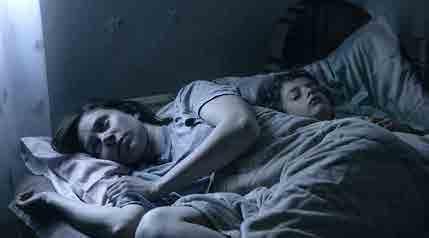
Ivan Salatić — geboren 1982 in Dubrovnik, heute Kroatien. Er machte seinen Master im Bereich Film an der Universität der Künste in Belgrad sowie in Hamburg. Seine bisherigen Kurzfilme verbinden Fiktion und Dokumentarfilm. DU HAST DIE NACHT ist sein Spielfilmdebüt, das in Venedig Premiere feierte. Er ist außerdem Fotograf und Videokünstler. — born in 1982 in Dubrovnik, today Croatia. He received his master‘s degree in film at the University of Arts in Belgrade and in Hamburg. His previous short films combine fiction and documentary. YOU HAVE THE NIGHT is his feature film debut, which premiered in Venice. He is also a photographer and video artist. Filme SHELTERS (2012, short) HEAVENS (2014, doc, short) BACKYARDS (2015, short) SPOTLIGHT: MONTENEGRO
Ihre letzte Fahrt endet in Genua, ein letztes Mal reinigt Sanja gemeinsam mit ihrer asiatischen Kollegin noch einmal die Kabinen. In der herbstlich-ungastlichen Großstadt möchte sie nicht bleiben. Sie kehrt zurück nach Bijela. Ihre Mutter, ihr Bruder und ihr kleiner Sohn wohnen dort, und ihr Freund ist auch noch da. Sein Vater ist arbeitslos und trauert den Zeiten unter Tito nach, als von der Werft aus wirklich große Schiffe ins Wasser gingen. Fast traumwandlerisch verlangsamt versuchen alle, ihren Alltag zu bewältigen. Sehr atmosphärisch, in streng komponierten Bildern und immer eng an seinen Figuren erzählt der Film von Lebenswegen, die ins Nichts führen in einer kleinen Stadt, die Opfer der Globalisierung wurde. Menschen werden von der Entwicklung überrollt, Menschen verlassen die Stadt – wie die schweren schwimmenden Werkbänke. Einst waren sie das Herzstück der Werftanlagen, nun werden sie, vorbei an der nächtlichen Kulisse der Stadt, langsam ins Meer hinausgesogen – nach China. Die Stadt bleibt zurück. WMH Her last voyage ends in Genoa: one last time Sanja cleans the cabins together with her Asian colleague. She doesn‘t want to stay in the city, the autumnal tones of which strike her as unwelcoming. Instead she returns to Bijela. Her mother, brother and little son live there, not to mention her boyfriend. His father is unemployed and mourns the passing of the Tito era, a time when really big ships departed from the dockyard. Slowed down to a dreamlike pace the locals try to cope with their everyday lives. Highly atmospheric, featuring carefully composed images and a close proximity to its characters, the film tells of roads of life that lead nowhere in a small city that has fallen victim to globalisation. Unable to keep up with the pace of development people are leaving the city, in a manner akin to the heavy floating workbenches: once the centrepiece of the shipyard facilities, they now slowly follow the pull of the sea, past the night-time backdrop of the city, on towards China. The city is left behind. WMH
Filmformat / Format DCP | Farbe / Colour Drehbuch / Script Ivan Salatić Kamera / Photography Ivan Marković Ton / Sound Jakov Munižaba Schnitt / Editing Jelena Maksimovic Ausstattung / Set Design Dragana Baćović Darsteller / Cast Ivana Vukovic, Luka Petrone, Jasna Đuričić, Momo Pićurić Produzent / Producer Dušan Kasalica, Jelena Angelovski Produktion / Production MEANDER FILM Co-Produktion / Co-Production Non Aligned films Kontakt / Contact MEANDER FILM meanderfilm@gmail.com phone: +382 67 643 444 Vuka Karadžića 6a 81400 Nikšić Montenegro
Momir Matović – Mensch und Landschaft Momir Matović – Man and Nature
In seinen Filmen portraitiert der 1951 geborene montenegrinische Kult-Dokumentarist Momir Matović Menschen, die sich dem Rhythmus der Landschaft anpassen. Er filmt im karstigen Hinterland der faszinierenden, aber trotzigen „Schwarzen Berge“, die von ihren Bewohnern zum Überleben vor allem eins abfordern: Geduld. Genauso geduldig beobachtet Matović seine Protagonisten, die nicht nur einer übermächtigen Natur gegenüberstehen, sondern auch den Zeitläuften der Geschichte: Wertewandel, Gentrifizierung und Landflucht hinterlassen ihre Spuren. Traditionen und Symbole verschwinden, und auch die Menschen gehen. BB
In his films cult Montenegrin documentary filmmaker Momir Matović, born in 1951, paints portraits of people who adapt to the rhythms of nature. He shoots in the karstic hinterlands of the fascinating yet unruly “Black Mountains”, which above all require patience of the locals. And it is with patience that Matović observes his protagonists who come up against not only an all-powerful nature, but also the forces of history: the evolution of values, gentrification and rural exodus all leave their mark. Symbols and traditions vanish, and at the same time the people who embody them. BB
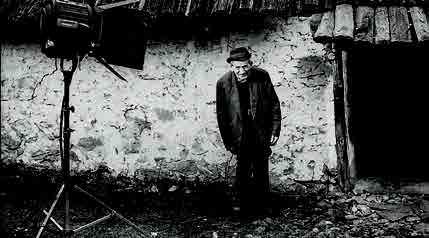
METRI ŽIVOTA DIE METER DES LEBENS METERS OF LIFE JUGOSLAWIEN / YUGOSLAVIA, 1991, 13 MIN Der 70-jährige Uikan Mekulović ist taubstumm seit seiner Geburt. Jeden Tag macht er sich zu Fuß auf ins nächste Kino, um sich dort einen Film anzusehen. Der Weg führt über mehrere Kilometer steiniger Hochgebirgswege. Seventy-year-old Uikan Mekulović was born a deaf-mute. Every day he sets off on foot to the nearest cinema in order to watch a film. The journey takes him across several kilometres of rocky mountain paths.
(PO) RAĐANJE JEDNE NACIJE DAS GEBÄREN EINER NATION DELIVERY OF A NATION JUGOSLAWIEN / YUGOSLAVIA, 1998, 13 MIN Jugoslawien nach dem Sozialismus. Mit der Transformation fallen die Symbole. Am Ortsrand wird der fünfzackige rote Stern abmontiert. Doch eine Handvoll in die Jahre gekommener Ex-Partisanen haben ihr Leben lang an die Ideen geglaubt, für die das mittlerweile angerostete Blech steht. Ihr Kampf geht weiter. Yugoslavia after socialism. As the transformation proceeds the symbols fall out of use. On the outskirts of town, the five-pointed star is demolished and yet a handful of veteran ex-partisans have spent a lifetime believing in the ideals for which the now-rusty piece of metal stands. Their struggle continues.
POSLEDNJA BIOSKOPSKA PREDSTAVA DIE LETZTE KINOVORSTELLUNG THE LAST CINEMA SHOW JUGOSLAWIEN / YUGOSLAVIA, 1992, 17 MIN Das Kino „Kultura“ in der montenegrinischen Hauptstadt Podgorica schließt. Eine Vorstellung noch, danach droht der Abriss. Die Kinomacher und ihr Publikum bereiten sich auf den Abschied vor. The Kultura cinema, located in the Montenegrin capital of Podgorica, is due to close. One more screening and then it‘s to be torn down. Filmmakers and audiences alike get ready to say goodbye.
TAM 4500 TAM 4500 TAM 4500 MONTENEGRO / MONTENEGRO, 2017, 23 MIN Irgendwo im kargen Gebirge. In den Dörfern leben nur noch wenige Alte, in der Schule lernt gerade mal ein Schüler. Der 62-jährige Risto Baćović fährt mit seinem 65 Jahre alten „Tam 4500“-Gelände-Lkw, der nur noch vom Rost zusammengehalten wird, von Haus zu Haus. Er holt Holz und Heu, bringt Mehl und Wasser – die soziale Seele einer untergehenden Welt. Somewhere in the desolate mountains. The villages are home to but a handful of old folks whilst the school plays host to a single schoolchild. Sixty-two-year-old Risto Baćović drives in his sixty-five-year-old “Tam 4500” truck, which is barely held together by rust, from house to house, collecting wood and hay and bringing flour and water, representing as he does the social soul of a disappearing world.
ŽICA ŽIVOTA DER DRAHT DES LEBENS STRING OF LIFE JUGOSLAWIEN / YUGOSLAVIA, 1996, 17 MIN Der Bus hält in einer leichten Kurve der Gebirgsstraße. Um die Mutter zu besuchen, müssen die Söhne einen Bach überqueren, dessen türkisgrünes Wasser unten in der tiefen Schlucht strömt. Ein Drahtseilakt. The bus stops on a gentle bend of a mountain highway. In order to visit their mother, the sons are obliged to cross a stream whose turquoise green waters flow far down below in the ravine. A real tightrope walk.
Momir Matović
Filmformat / Format DCP | doc. | Farbe / Colour Drehbuch / Script Momir Matović Kamera / Photography Savo Jovanović Schnitt / Editing Lana Vukobratović Musik / Music Zarko Mirković Produktion / Production Zeta Film Kontakt / Contact Matfilm Momir Matovic Marka Miljanova 69 81000 Podgorica Montenegro Tel/Fax: +382 20 231 727 matfilm@t-com.me
Živko Nikolić (1941—2001)
Geboren 1941 in Ozrinići nahe Montenegros zweitgrößter Stadt Nikšić, lebte Živko Nikolić vor allem in Belgrad (Serbien/Jugoslawien), wo die Filme dieser kleinen Retrospektive bei den renommierten Produktionsfirmen Dunav-Film und Centar-Film entstanden. In seinen 27 Filmen und zwei TV-Serien überschreitet er verschiedene Genre-Grenzen. Thematisch blieb er seiner Heimat treu. Seine frühen Dokumentarfilme, von denen wir einige im Vorprogramm des SPOTLIGHT: MONTENEGRO zeigen, bewegen sich an der Schnittstelle zwischen kontemplativer Beobachtung und metaphorischer Inszenierung. Meist stehen Menschen im Mittelpunkt, die sich im harten Alltag des Karst-Gebirges, aber auch gegen die Allmacht der Tradition, patriarchale Konventionen und rigide Geschlechterrollenverteilungen bewähren müssen. Nikolićs Werk stellt der althergebrachten Lebensweise in den Bergen die modernen Einflüsse gegenüber, die unten, an den Stränden der Adria-Küste, den Alltag verändern; dort, wo in den 1970er-Jahren erste Nudisten-Paradise und Hippie-Kolonien entstehen. Die Filme leben von den Gegensätzen, von den gesellschaftlichen Reibungen, die fast unbemerkt ins Zentrum der Beobachtungen rücken. Die Ideen und Industrialisierungsprojekte des Sozialismus wirken in den Bergen Montenegros gegenüber der Tradition oft fremd, fast so surreal wie die ersten Nackten am Strand, und doch kündigen sich hier Veränderungen an, die nicht mehr rückgängig zu machen sind. Nicht selten steht in Nikolićs Arbeiten der Beobachter, der Außenseiter, vielleicht ein Alter Ego des Filmemachers, im Mittelpunkt, der mit Interesse und Verwunderung auf sein Land schaut, dass nach einer Position zwischen Beharrlichkeit und Wandel sucht. Ein nachdenklicher, zuweilen verhalten spöttischer, analytischer Blick, der noch heute im montenegrinischen Kino nachhallt. BB
Born in 1941 in Ozrinići near Montenegro‘s second largest city Nikšić, Živko Nikolić lived in Belgrade (Serbia, Yugoslavia), and his films which are part of this short retrospective were made by the renowned production companies from Belgrade, namely Dunav-Film (short films) and Centar-Film (THE BEAUTY OF VICE). In his twenty-seven films and two TV series he transcends genre boundaries. All the while he remained thematically faithful to his homeland. His early documentary films, some of which we present in the pre-programme of the SPOTLIGHT: MONTENEGRO, test the boundaries between contemplative observation and metaphorical film-making. The focus is generally on individuals who have to stand firm in a harsh everyday life surrounded by karstic mountains, as well as against the omnipotence of tradition, patriarchal conventions and rigid gender roles. Nikolić‘s work juxtaposes the traditional way of life in the mountains with the modern influences that transform everyday life on the beaches of the Adriatic coast; places where the first nudist paradise and hippie colonies came into being back in the 1970s. The films are based on opposites, on the social friction that, almost imperceptibly, comes to form the focal-point of these observations. The ideas and industrialisation of socialism, as applied to the mountains of Montenegro, often appear alien to tradition, almost as surreal as the first nudists on the beach, and yet here there are also signs of changes that can no longer be reversed. Not infrequently Nikolić‘s works focus on the observer, the outsider, perhaps an alter ego of the filmmaker himself, who looks on with interest and wonder at his country, seeking a happy balance between perseverance and change. A thoughtful, at times cautiously mocking and yet analytical gaze which still reverberates in Montenegrin cinema today. BB SPOTLIGHT: MONTENEGRO Živko Nikolić (1941—2001)
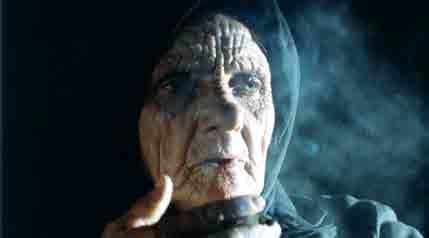
Živko Nikolić
BAUK DER ERLKÖNIG BOGEYMAN JUGOSLAWIEN (SERBIEN) / YUGOSLAVIA (SERBIA), 1974, 16 MIN Die Mühen des Alltags in den Bergen: Lasten schleppen über enge, steile Wege. Der Mensch ist klein am Fuß der Berghänge. The hardships of everyday life in the mountains: loading hauls over narrow, steep paths. Man is small and insignificant at the foot of the mountain slopes.
BILJEG MERKMAL A STAMP JUGOSLAWIEN (SERBIEN) / YUGOSLAVIA (SERBIA), 1981, 9 MIN Dort tragen sie noch das Wasser in Fässern den Berg hoch. Daneben wurde mal ein Wasserkraftwerk gebaut, steht aber als Bauruine in der Gegend herum, bewacht von einem Mann mit Gewehr. Auf der Tonspur traditioneller Sprechgesang, der die „Hydro-Elektrik“ preist. Ein spöttelnder Kommentar auf die „Errungenschaften“ des Sozialismus. There they still carry the water up the mountain in barrels. Not far from here a hydroelectric power station was built, yet now it stands as a ruin, watched over by an armed guard. On the sound track traditional chanting in praise of hydroelectricity is blended in. A tongue-in-cheek commentary on the „achievements“ of socialism.
GRADITELJ DER BAUMEISTER BUILDER JUGOSLAWIEN (SERBIEN) / YUGOSLAVIA (SERBIA), 1980, 10 MIN Eine improvisierte Siedlung im Dauerregen: hier noch einen Stein zur Beschwerung aufs Dach, dort versuchen, eine Pfütze zu überwinden. Der Aufbau kommt nur langsam voran. An impromptu settlement in the constant rain: here a stone to weigh down the roof, there an attempt to cross a puddle. The construction work progresses slowly.
INE ANDERE OTHERS JUGOSLAWIEN (SERBIEN) / YUGOSLAVIA (SERBIA), 1978, 14 MIN Mann und Frau. Er bindet den Schlips, verlässt das Haus. Draußen tanzt die Jugend zu Rockmusik. Hip-pies in den Straßen. Die Zeit ist gesprungen: vom archaischen bäuerlichen Leben ins Zeitalter der Pop-kultur. Man and woman. He ties his tie and leaves the house. Outside, youngsters dance to rock music. Hippies on the streets. Time has moved on: from an archaic peasant existence to the age of pop culture.
ŽDRIJELO DER SCHLUND THE GORGE JUGOSLAWIEN (SERBIEN) / YUGOSLAVIA (SERBIA), 1972, 12 MIN Menschen und Landschaften: Alltägliche Mühsal in steiniger Landschaft, unterbrochen von geselligem Lachen, aber auch brutalen Schlägen. People and landscapes: everyday hardship set to a stony landscape, interrupted by convivial laughter, as well as brutal beatings.
Filmformat / Format DCP | doc. | Farbe / Colour Drehbuch / Script Živko Nikolić Kamera / Photography Slavko Vukčević Ton / Sound Radivoj Vujić Schnitt / Editing Klea Harisijadis Produktion / Production DUNAV FILM Beograd Kontakt / Contact Jelena Bogdanov Sremčević jelena@dunavfilm.com
LEPOTA POROKA SCHÖNHEIT DER SÜNDE THE BEAUTY OF VICE
Die junge Jaglika heiratet den traditionsbewussten Luka. Die beiden ziehen ans Meer, wo sie Arbeit in einem FKK-Hotel gefunden hat. Mit den Touristen sind lockere Sitten eingezogen – Jaglika verfällt der Schönheit der Sünde. Um seine Ehre wiederherzustellen, müsste Luka sie ins Heimatdorf zurückbringen und töten. Doch auch er hat sich verändert. Kult-Tragikomödie über den Wandel von Moralvorstellungen. The young Jaglika marries the tradition-conscious Luka. The two move to the seaside where she has found work in a nudist hotel. Lax morals have come with the arrival of the tourists – Jaglika is seduced by the beauty of sin. Luka would need to bring her back to their native village and kill her there in order to restore his honour. But he‘s also changed. Cult tragicomedy about the changes to moral values.
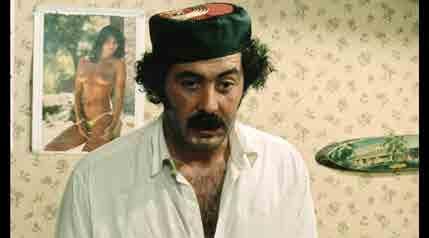
Živko Nikolić — geboren 1941 in Ozrinići, nahe Montenegros zweitgrößter Stadt Nikšić. Er lebte vor allem in Belgrad (Sebien/Jugoslawien), wo viele seiner Dokumentarfilme entstanden. Das 29. FFC zeigt fünf davon in einer kleinen Retrospektive. Er realisierte außerdem mehrere Spiel- und Fernsehfilme sowie -serien. 2001 verstarb Nikolić in Belgrad, heute Serbien. — born in 1941 in Ozrinići, near Montenegro‘s second largest city Nikšić. He lived mainly in Belgrade (Sebia, Yugoslavia), where many of his documentaries were made. The 29th FFC shows five of them in a small retrospective. He has also made several feature and television films and series. Nikolić died in Belgrade in 2001. Filme MARKO PEROV (1975, doc, short) UNSEEN WONDER (1984) SPOTLIGHT: MONTENEGRO Živko Nikolić (1941—2001)
In der rauen Berglandschaft ist es Sitte, dass der Ehemann der Braut in der Hochzeitsnacht ein Tuch über das Gesicht legt. Und wenn die Ehefrau untreu wird, muss er sie aus dem Dorf bringen und dort mit einem Hammer erschlagen. An der Küste herrscht hingegen eine ganz andere Moral. Denn der Tourismus bringt Devisen nach Jugoslawien. Besonders die Nacktbadestrände ziehen unzählige Begeisterte aus aller Welt an. Jaglika bewegt sich zunächst keusch und unnahbar zwischen den Touristen, aber dann lockert sich ihre Moral: Sie verfällt einem nackten Engländer und hat Gruppensex. Ehemann Luka bringt sie zurück ins Heimatdorf, um sie nach altem Brauch umzubringen, doch auch er kommt ins Nachdenken. Dramatische, oft schwarzhumorige und zuweilen recht „dralle“ Tragikomödie über den Zusammenprall von Tradition und Moderne und die Auswirkungen des Tourismus auf die Veränderung von Moralvorstellungen. WMH It is customary in the rugged mountain scenery for the bride‘s husband to place a cloth over her face on their wedding night. And if the wife is unfaithful, he must then take her out of the village and kill her with a hammer. But a quite different morality holds sway down on the coast. For tourism brings hard currency to Yugoslavia. The nudist beaches, in particular, attract countless enthusiasts from all over the world. At first, Jaglika moves chastely and aloof between the tourists, but then she relaxes her moral standards: she falls for a naked Englishman and has group sex. Her husband Luka takes her back to their native village to kill her in accordance with the old custom, but he then also starts to reflect. Dramatic, often darkly comic and, at times, rather „strapping“ tragicomedy about the clash of tradition and modernity and the effects of tourism on the changes to moral values. WMH
Filmformat / Format DCP | Farbe / Colour Drehbuch / Script Živko Nikolić Kamera / Photography Radoslav Vladić Ton / Sound Svetislav Ristić Schnitt / Editing Zoltan Wagner Musik / Music Zoran Simjanović Ausstattung / Set Design Miodrag Mirić Darsteller / Cast Mira Furlan, Milutin Karadžić, Petar Božović, Alain Noury, Ines Kotman Produzent / Producer Milan Žmukić








